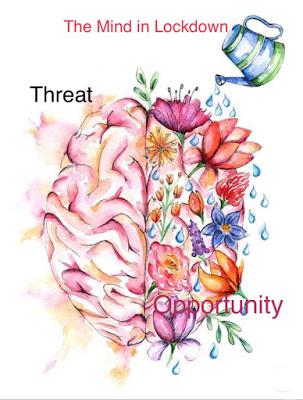by Nina

Uh, oh! I feel a rant coming on. It all started when a yoga person posted the above graphic with a question: Are you embracing the lockdown? Or resisting it? To be honest, the question made me a bit angry. I immediately thought of all the people around the world who had lost their loved ones, had lost their jobs, had lost their homes, were killing themselves with work to help those in need, were sick themselves, and so on. Were they supposed to look at the pandemic as an "opportunity"? And if they weren't "flourishing" right now, was that somehow their own fault because they didn't take the proper attitude toward their situation? Then, there are those of us who are privileged enough to have jobs, food, a place to live, etc. Should we still be expected to flourish during this difficult time? For example, should someone who has been living alone without experiencing any human touch for more than seven months, with no end in sight, be expected to see their new, completely solitary life as an "opportunity"? So, yeah, I couldn't resist commenting. I said that I felt this duality was neither kind nor helpful. And I asked whether there wasn't something in between these two "opposites," something more along the lines of acceptance? The post felt very judgmental to me, but I did try to be polite in my response.
But it got me thinking. Later in the day when I was taking a walk with Brad, I told him about what had happened. He said something I thought was so perceptive:
"Did you ever look at a plant that has gone through a long drought? It's obviously not flourishing! But it has survived. That's all we need to do right now—survive. There will be time to flourish later."
We live in an area that is regularly plagued by droughts as well as forest fires, so I was easily able to picture a majestic redwood tree, like the ones I love to visit in the Muir Woods, with its needles dry and brittle but its core strong and solid, waiting patiently for the winter rains to return.
And I thought about the Bhagavad Gita. I told Brad that in that story, the man-god Krishna is counseling Arjuna, who is about to face great difficulty: going into a battle where he might be forced to kill relatives and beloved teachers. Although Krishna strongly encourages Arjuna to do his duty as a warrior and fight the battle he has signed up for, he does not tell Arjuna to "embrace" the "opportunity" before him. Instead, he tells him to take the yogic approach to the his work, which means facing the difficulty with an attitude of equanimity, or an evenness of mind.
"Set thy heart upon thy work, but never on its reward.
Work not for a reward; but never cease to do thy work.
Do thy work in the peace of Yoga and, free from selfish desires, be not moved in success or failure.
Yoga is evenness of mind—a peace that is ever the same." —translated by Juan Mascaro
In the end, after much discussion, Arjuna accepts Krishna's advice, committing to a yogic approach, and enters into the battle. Do you ever wonder what happens after that? The end is actually tragic. Arjuna does survive, but the war is a complete disaster and both the armies, Arjuna's and the one he and his brothers are fighting against, are slaughtered. Afterward, Arjuna is cursed by Gandhari, King Dhritarashra's wife, for allowing that slaughter to take place. Eighteen years later, at the end of his life, Arjuna does achieve enlightenment, but he has a lot more difficulty to get through before that happens. To put it bluntly, even after he "embraces" yoga, his life is not a lush garden of spring flowers.
All of this is why I think the duality of "threat" vs. "opportunity" is a false one and is a way of thinking that makes light of the true nature of difficulty, including the challenge of surviving through a global pandemic. On the other hand, yoga does provide us with a solution that is both more helpful and more compassionate for those who are living through difficulty: cultivating equanimity. As the Bhagavad Gita tells us, a yogi is one:
"Who unperturbed by changing conditions sits apart and watches and says 'the powers of nature go round', and remains firm and shakes not.
Who dwells in his inner self, and is the same in pleasure and pain; to whom gold or stones or earth are one, and what is pleasing or displeasing leave him in peace; who is beyond both praise and blame, and whose mind is steady and quiet." —translated by Juan Mascaro
So, don't let anyone shame you for not choosing to "embrace" the difficulties you're facing these days. Instead, simply use whatever yoga practices help you to stay steady throughout these challenging times. And if you find yourself at your wits end now and then, have as much compassion for yourself as you would for another.
Subscribe to Yoga for Healthy Aging by Email ° Follow Yoga for Healthy Aging on Facebook ° To order Yoga for Healthy Aging: A Guide to Lifelong Well-Being, go to Amazon, Shambhala, Indie Bound or your local bookstore.

